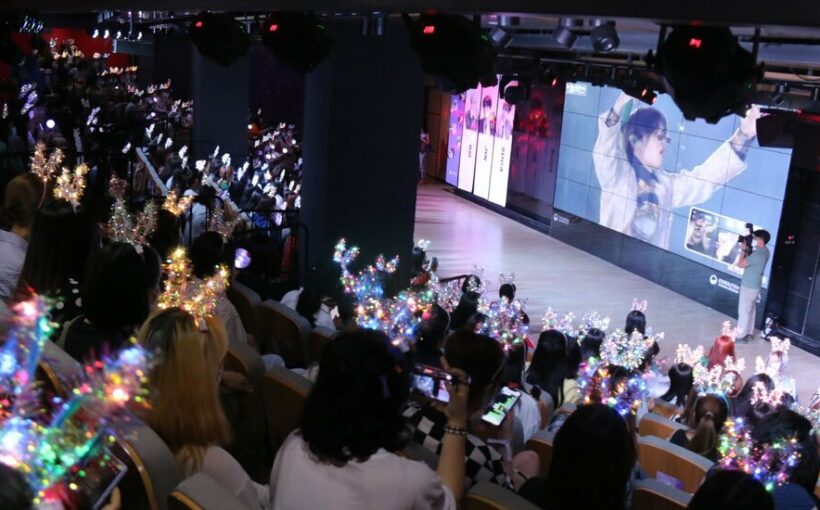HONG KONG — One month before the 26th birthday of Park Ji-min, a member of the South Korean boy band BTS, his fans in China pooled money to plaster his photographs and a declaration of their “eternal love” on the exterior of an airplane.
As pictures of the customized Jeju Air plane circulated widely in China last week, Weibo, a Chinese microblogging platform, took notice. It accused the fan account of “illegal fund-raising,” and on Sunday, it banned the page from posting on the site for 60 days.
The First in the world—Customized Exclusive Airplane in cooperation with Jeju Air
Period: 9.1-11.30
Flight Number: HL8087
Note: The route may be changed due to some special reasons, please download Flightradar24 to check the flight information. pic.twitter.com/vp6AMpqjgd
Weibo did not stop there. Hours later, the social media platform said that it would also suspend 21 other K-pop fan accounts for a month, including those that worship other BTS members; the girl group Blackpink; and EXO, a band with Chinese members, after receiving complaints.
It was not immediately clear what social media crimes the fan accounts for Blackpink and EXO were deemed to have committed, but the move by Weibo came amid the backdrop of a broader government crackdown on celebrity worship and online fan culture in China.
Beijing has recently taken steps to rein in fan clubs amid growing concern that the quest for online attention and celebrity adulation is poisoning the minds of the country’s youth.
In its statement, Weibo said that stricter oversight of the fan groups would “purify” the online atmosphere and fulfill the platform’s responsibilities to society. It said that it would remove related blog posts that violated regulations and stressed that it “firmly opposes such irrational celebrity-chasing behavior and will deal with it seriously.”
Weibo repeatedly cited a National Radio and Television Administration notice issued on Thursday for the need to manage the “chaos of fan clubs.” In the notice, the government regulator said it would ban broadcasts of “vulgar internet celebrities” and feminine-looking men. It stressed the importance of rectifying the “unlawful and immoral behavior” of celebrities and of upholding an industrywide standard of “loving the party and loving the country” in artistic creations.
Representatives for BTS, Blackpink and EXO could not immediately be reached for comment. K-pop fans denounced Weibo’s action, calling it unwarranted and overly harsh.
Agnes He, a university student in the southeastern Jiangsu Province of China, said that she believed it could help rein in fan behavior that had gone too far. But she also fretted about whether she could still buy albums at a discounted price through group purchases organized by the fan accounts.
Latest Updates
“I am quite sensible when chasing stars,” Ms. He said in a phone interview on Monday, adding that she saw pop idols as positive and energizing influences. “It’s a personal freedom. Just because I like Korean pop idols doesn’t mean I’m not patriotic.”
K-pop fans around the world are known for their organizational prowess, with many decking out billboards, giant LED screens and public transportation vehicles to show support ahead of an album release or a favorite band member’s birthday. Some have turned to political activism, and others took credit for helping to inflate expectations for a rally in Oklahoma for Donald J. Trump, then the American president, by reserving tickets they had no intentions of using.
But the online armies of Korean pop music fans are running up against President Xi Jinping’s sweeping agenda to clean up aspects of the entertainment industry in China. The Cyberspace Administration of China banned the ranking of celebrities by popularity. A regulator also accused an actress, Zheng Shuang, of tax evasion, fined her more than $46 million and ordered broadcasters to stop showing content in which she had appeared.
BTS ran afoul of Chinese patriotic sentiment last year, when its leader, Kim Nam-joon, who performs under the stage name RM (formerly Rap Monster), made a seemingly innocuous remark about the shared suffering of Americans and Koreans during a ceremony commemorating the Korean War.
Chinese internet users erupted in anger, questioning why he had not also recognized the sacrifices of the Chinese soldiers who had fought on the side of North Korea. To pre-empt a nationalistic backlash, multinational brands scrubbed references of their collaborations with BTS on their Chinese websites and social media accounts.
This week, Chinese internet users both celebrated and criticized the suspension of the K-pop fan accounts. Some saw it as a necessary balm against idol worship and excessive spending on celebrities, even going as far as to call BTS an “anti-China group” and Korean pop music a form of “cultural invasion.”
Dew Ding, a 24-year-old filmmaker in Beijing, was among those who supported the banning of the BTS singer’s fan account, saying that fans were overly incentivized to spend money in order to maintain an imaginary relationship with their idol.
“This crowdfunding is getting more and more crazy, so I don’t think is a good thing,” she said.
But Allen Huang, a Taipei-based D.J. who often writes about K-pop, said he did not believe that the ban would be effective in stopping fan accounts. To evade censorship and suspensions, many were rushing to hide their fund-raising campaigns, he said, sometimes by merely removing the word “fan page” from their accounts.
“Chinese people will find ways to continue to support, whether that’s through non-Weibo fan clubs, silent fund-raising or just a rebranding of the idea of fan funding,” he said.
Li You, Claire Fu and John Yoon contributed research.
Source: Read Full Article
